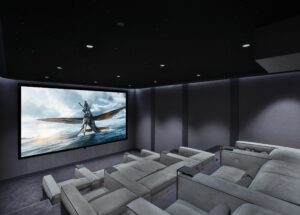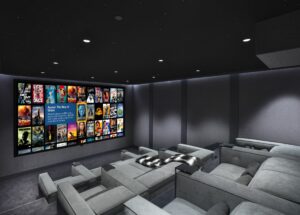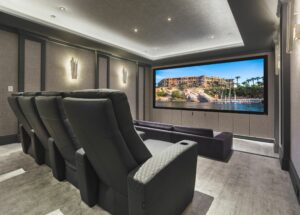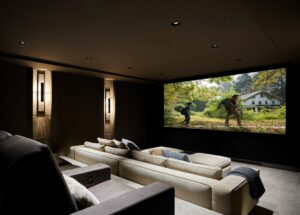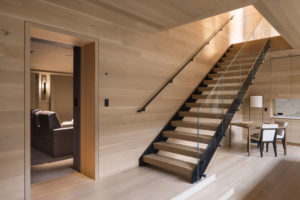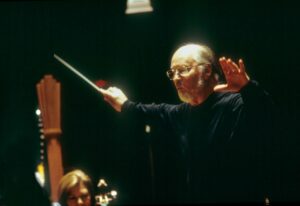CEDIA, Expo and The Cinema Connoisseur Community
CEDIA has served as the organizational identity of an industry that, in the 34 years of CEDIA’s presence, has grown, evolved and transformed. One thing will not change. A big part of the CEDIA story is the private cinema or home theater. Although, much of the talk around and by CEDIA itself covers the gamut of home technology, from home health care, the internet of things and a recent term, resimercial, with little mention of private cinema. When we look at CEDIA’s mission statement, ‘To connect, empower, and champion home technology professionals and businesses that enrich our lives,’ we might consider what could be more enriching than a private cinema where we gather with family and friends in an environment that, for a short time, transports us from our busy lives, where we can share entertainment artforms with those we hold most dear. The private cinema is a CEDIA essential.
Like CEDIA itself which endeavors to establish consumer awareness and value, the private cinema suffers from an identity crisis of its own. Much like the organization works to differentiate its identity as ‘The Association for Smart Home Professionals’ from the DIY gadgets on the internet or in your local hardware store, the private cinema must offer our community and those who would join us an experience worthy of consideration and their enthusiastic embrace. After all, a connoisseur is, in essence, the highest form of enthusiast!
For this feature, The Cinema Connoisseur reached out to some of the people who built this community, although most of us didn’t realize that was what we were doing at the time. In my case, I had found a home for my passion to create and nurture my love of sound. Others have similar origin stories. One arguably started it all. We asked what they had to say about the public’s awareness of private cinema and luxury private cinema. We wanted to know their thoughts about CEDIA’s and Expo’s impact on the private cinema consumer, those we create these rooms for. Finally, we wondered what these private cinema specialists and industry icons hope for and anticipate in the coming years.
Public Perception of Private Cinema
“One of my first theaters In the early days was in the Hamptons,” recalls Theo Kalomirakis, about those heady days of discovery and passion in the late 80s and early 90s. “This was before I really knew what I was doing! And do you know what he [the client] did? He asked me not to design another theater within 50 miles for 5 years.” Theo speaks of the perception these early enthusiasts had of private cinema. “That was when a private theater was unique, celebrated. That’s good, yes?”
Muses the maestro, “Somewhere along the line, we lost focus with the client, and the client lost focus with what is vital for them. When we started the [private theater] business years and years ago, it meant something emotionally to people. They wanted to be able to capture all the drama of watching a movie. A connection with the movie through a space that makes it even more special. The theater was a destination that took them 10 million years away. That original experience of a private theater was lost. And it became a commodity. It became buzzwords of how we make more money. Do we have 4K, 3D, Atmos? These are buzz words that should be the ice on the cake, not the total experience.” Theo, who inspired many of us following in his footsteps, has a point. We would do well to listen.
Of the twenty plus respondents to our inquiry, over half shared the opinion that the public’s awareness of private cinema is low. The consensus was unanimous, but opinions varied on the reasons why and what could, or should be done, and by whom. Most agreed we need to do a better job of getting the word out to our community and then to back that evangelism up with high quality experiences. One observation is telling, some 34 years into it as an industry, Peter Aylett, Chair of the CEDIA/CTA R10 Standards Committee and Partner at Officina Acustica observes, “I don’t believe we have general public awareness because we don’t have a consensus or objective definitions of what a private cinema is.” CEDIA has done good work, at least, on the technical side of that question, with the development of RP22 Immersive Audio Design Recommended Practice, which will be introduced at CEDIA Expo 2023 and RP23 Home Theater Video Design Recommended Practice, currently being developed. The next step according to many of our respondents is to find a way for our public to value and experience the fruits of this labor! “Having an objective standard and definition for what various levels of private cinema performance mean, standards that are defined in a way that is measurable and to which providers are held accountable, is a big deal,” says Ryan Brown, Paradise Theater CEO. He adds, “It may not demystify the technologies, but it provides a standard the consumer can rely upon. It will instill the confidence for clients to invest knowing full value will be received.”
“I would say most consumers have not experienced a well-executed home cinema,” says Jeff Mitchell, Market Leader and Tech Advisor for AudioVisions, an integration firm founded in 1989 by Mark Hoffenberg. AudioVisions knows a thing or two about the subject (See Minema, A Cinema Story). Ryan agrees saying, “Client awareness of what private cinema can or should be is really very low. The many terms and technologies that seem to continuously change leave our consumers, high net worth clientele, confused, frustrated and wary of investing in something they do not have a personal connection with.” He asks, “ Who do they trust? Where can they go to experience private cinema, gain objective insight, dialog and find their own appreciation for what could be at the top of their list of personal interests?” How can aspiring private cinema owners who have not had that experience know that they are getting the right advice? “Education,” offers Ken Hoffman, CEO of Quantum Media Systems, integrators of digital cinema technology. He continues to say, “Education of integrators, because they are the front line.” But, Ken asks, “Are they listening to their clients?” Ken suggests that training integrators to do so will make a difference, as he adds, “Some integration companies are phenomenal and they pick the right products, the best methods, and won’t compromise. But how can a client know that?”
“The general public could be more aware of the details, products and design that go into a true studio cinematic experience,” observes Stewart Filmscreens VP of Sales, Adrian Silva. He adds, “CEDIA and Expo have resources.” Daryl Friedman, CEDIA Global President and CEO, reveals that, “CEDIA continues to provide resources and recognition for the private cinema and luxury private cinema community. With support from industry professionals who act as volunteers, CEDIA produces a number of white papers and recommended practices.” Daryl goes on to cite a big moment for CEDIA saying, “The association is set to unveil the Immersive Audio Design Recommended Practice (RP22) during this year’s CEDIA Expo in Denver. For the first time in history, four levels of performance have been established to deliver an immersive audio experience. The first level satisfies the essential requirements, the second level presents an elevated experience, the third level achieves or surpasses that of a commercial cinema, and the fourth level embodies cutting-edge excellence.” Daryl promises more to come saying, “CEDIA’s commitment extends further with an upcoming Immersive Video Design Recommended Practice and other resources aimed at facilitating optimal design for a truly exceptional consumer experience.” Peter, who chairs the committee responsible for these recommended practices, reasons, “As an industry we need to work hard on our brand to elevate the public’s perception of what a real private cinema experience can be.”
A Private Cinema Definition?
“It is an environment. It’s not a room. It prepares you to enter into something special and you leave all the other things outside the door,” Theo says of the transportive nature of the private cinema, illustrating his point, as is his custom, with a story. “When you went to the Roxy in New York City, an old movie palace that was my first inspiration, you would go from one level to another, like a submarine, as it relates to separating from the danger of the open sea. The ticket lobby was 12 feet high, the intermediate lobby was higher, and the grand lobby was 70 feet. Many layers before finally entering the theater with its 120-foot ceiling! A journey that prepares you to experience something special. That emotional connection to the movie!”
Theo’s theater palaces were not quite the scale of The Roxy, but he did employ, to great effectiveness, the principle of acclimatization. By the time the audience takes a seat, and the lights go down, one journey has been taken so another can begin. The anticipation, mystery and drama of Theo’s story is one way to prepare us for the “willing suspension of disbelief” filmmakers work so hard to evoke. Other creative minds and good designs have brought private cinema audiences to that point of heightened anticipation as well. It is, however, just the starting point of a quality private cinema experience. Yet, to what benefit if the environment, the audio or image quality, the systems operation or the audience comfort break the spell or fail to cast it altogether? Worse still, is an audience that does not know or care that magic is there for them to experience.
Andrew DeCristofaro, Oscar nominated Supervising Sound Editor and a private cinema connoisseur himself, speaks of how diminished audience appreciation affects him as a filmmaker. “Formerly, I knew that the audience would experience my work at least once in a proper movie theater. Later viewings would be at home or worse – handheld viewing devices. The new paradigm is that some of my work will only be experienced at home.” Drew’s artistic concern is shared with others. Colleague Mark Mangini points out in this issue of The Cinema Connoisseur, how audience indifference could adversely affect the art itself! Drew sees the well-executed private cinema as a saving grace saying, “Knowing that people will be able to enjoy the films the way they were meant to be experienced gives me great satisfaction. So, private cinema makes my heart sing!”
Tim Sinnaeve, former director of Barco Residential and now Director of Barco’s Digital Canvas, defines private cinema as “simply a dedicated space in a home to experience movies and other forms of storytelling.” Tim depicts a luxury private cinema as “where technology, architecture and design come together in a no-compromise fashion to create a movie experience that truly transports you into the storyteller’s world.” Tim shares the story of a client who had invested in Barco Residential’s flagship projector at the time, much to the surprise of the integrator who had originally specified a good, but much less costly or capable specification. Tim shares an important insight saying, “The client was utterly delighted and so was the dealer. But the client was not really looking for a projector.” Clarifying his surprising statement, he adds, “It isn’t the projector, it is the experience that projector makes possible.” If the experience is the defining attribute, then the elements, the technology, the architecture and design, everything must deliver.
Impact on The Cinema Connoisseur Community
There is no question that CEDIA and the CEDIA Expo are the community and the gathering where private cinema is most comprehensively considered and demonstrated. Daryl observes, “The topic is heavily discussed throughout CEDIA Expo, and CEDIA awards the best designed home theaters of the year at the annual CEDIA Smart Home Awards held globally.” At Expo, vendors collaborate to create home theater demonstrations ranging from simple to extreme, the latter requiring advance reservations to be assured of a seat, or for those unfortunates without, long lines to take it in. The buzz about these demos is almost as loud as the Expo noise floor! “Those vendors that make the considerable effort to deliver high quality cinematic experiences at Expo educate integrators on the possibilities they may not otherwise have been exposed to,” states Geoffrey Heinzel, Ascendo Immersive Audio, Managing Partner. Trinnov’s Chuck Back agrees, “CEDIA Expo can provide integrators with the opportunity to experience the highest levels of excellence in private cinema.”
CEDIA Education has historically been a major component of Expo as well. This year a focused offering of about 100 courses overall and 60 core courses (as opposed to vendor trainings) is slated. Chuck Back notes that “CEDIA Expo’s educational programs are aimed at increasing the competence of current integrators and teaching the next generation.” Jeff Mitchell from AudioVisions agrees adding, “CEDIA educates the Integrators who are providing cinemas to their clients.” Sometimes that education can have an unintended but positive impact. One private cinema connoisseur recalls his CEDIA educational experience. “Let’s go to CEDIA,” said the owner of The Minema Immersive Cinema (see The Minema, A Cinema Story ) when initially planning the theater project. “I actually signed up for one of the theater design courses.” He explains, “I just wanted to see what I might learn.” It seems the most valuable lesson learned from CEDIA was to seek design and engineering assistance first. “That was music to my ears,” he recalls, pointing to the objectivity of a design and engineering approach over a “selling the equipment” model, saying, “it’s been a great experience since.”
“CEDIA Expo brings all of the manufacturers of cinema to one place to exhibit their latest and greatest technology,” says Adrian, and Global Director of Barco Residential, Daniel Nilsson, reports, “We build up, at times, hundreds of thousands of dollars into Expo.” Alvin Hellemans, CINEAK Luxury Seating President says, “For its visitors, and even exhibitors, CEDIA Expo functions as a window to everything that’s already out there, and what’s new in the private theater industry.” A statement that brings up a question The Cinema Connoisseur asks. Who should those visitors include? Gary Blouse, VP of North America Sales for Storm Audio posits, “CEDIA does well at providing venues where dealers can learn about products used in the private cinema. What CEDIA does less well is providing end users an in-person experience of a luxury private cinema. The fact is, most clients don’t realize that this type of experience even exists.” Daniel suggests, “Something Barco Residential has envisioned is for the CEDIA Expo to have a day opened to end users. A curated event, knowing end users would attend with security and confidentiality measures as needed. Something like that would address consumer awareness of what a private cinema experience could be.” Steinway Lyngdorf’s Katherine Spiller shares her take on the idea saying, “I like the word curated. it doesn’t need to necessarily be something that’s completely exclusive. Possibly end users attend with a partner or as a design community guest. Bringing the public in through partner channels widens the community and the connection.” Katherine cautions however, “The superpower of Expo is its ability to bring so many of our partners together to share ideas and to inspire each other.”
Paul Hales of PRO Audio Technology, who has spoken previously in The Cinema Connoisseur about “Sharing the Wine,” gives us his take on private cinema, the community and CEDIA. “We are big supporters and believers in private and luxury private cinemas. We fully support creating more public awareness around private and luxury private cinemas and intend to help the cause at CEDIA Expo.” Paul continues, “With most luxury goods, whether it be cars, watches, or fine wines there are a plethora of resources, events, forums, etc., giving collectors and enthusiasts a sense of community and destination to find others like them, share in their passion for their chosen interest, and to learn from one another. Up until The Cinema Connoisseur was founded, there wasn’t a sense of community for private cinema consumers. We are grateful to The Cinema Connoisseur for giving private cinema and luxury cinema enthusiasts a place to learn, connect, and share in their passion.”
As the publisher of The Cinema Connoisseur, these ideas are very gratifying to hear after all our mission is to build this community and further the awareness and advance the experience of the private cinema. To enhance the lives of those who admire the private cinema, the experience nonpareil!
